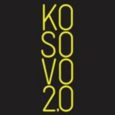With 12 days left until voting day, election fever is in full swing. Hyperbole and ambitious promises dominate the discourse, with 24-hour news coverage jumping from interview to interview, and topic to topic.
In this series, K2.0 is taking a step back from all that. Building up to election day on June 11, we’re taking some of the big issues facing Kosovo today, and looking into solutions offered by each of the five Kosovar Albanian political parties represented in the Assembly during the last parliamentary term; their programs, their manifestos, their policies.
From domestic violence and sexual harassment, to child marriage, to high levels of discrimination over employment and property rights, to sexism in both the public and private sector — gender equality is a pressing issue in Kosovo. The list goes on. Discrimination against women is not just a phenomenon present within the family and labor market, but extends to the judiciary, police and social services. Recent years have seen cases of domestic violence ending in death, with women rights activists highlighting how inefficiency in the justice system can be fatal for women.
Decision-making positions in both government and the municipalities continue to be male dominated. Reports show that women held only 5.2 percent of leadership positions in the government in 2015, while at the Assembly, women held only 19 out of 52 senior leadership positions. Legislation on gender equality passed in the same year aims for a “minimum representation of fifty percent (50%) for each gender, including in governing and decision-making bodies.” However, the voting lists of the three main political groupings at this year’s election only include a maximum of 33 women out of the total 110 candidates for deputies.
Meanwhile, economic inequality leads to further marginalization of women. In Kosovo, more than 75 percent of women are classed as economically ‘passive,’ meaning that they are not even looking for a job. The participation of women in the labor market is estimated to be the lowest in Europe; in total, only around 15 percent of women in Kosovo are employed.
K2.0 contacted each of Kosovo’s five major parties and assessed their programs, to discover how they would attempt to create a more equal society in the future.
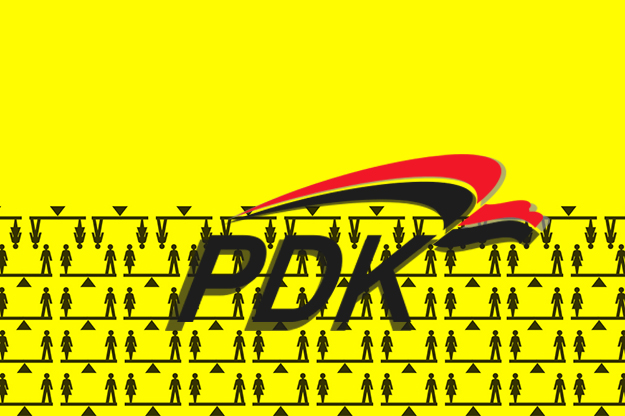
Democratic Party of Kosovo (PDK)
In the lead up to this campaign, PDK’s president Kadri Veseli published a series of promotional videos uploaded to his Facebook profile. He has encouraged women to participate in entrepreneurship and institutional life, especially within the ICT sector, all as part of PDK’s “New Beginning.”
It is not the first time PDK have stressed gender equality in a campaign. In its 2014 program, “The New Mission: 2014-18” the party dedicated two pages outlining their plans for the “Empowerment of the Role of Women in Society”, including a pledge that PDK would be committed to bigger financial support for women. Around 10 millions euros of the “Fund,” a source of money earmarked to develop the economy, was allocated for women in business. However, the fund was never created.
The New Mission also foresaw financial support for the participation of women in society and education, including offering free higher education to all women. PDK has led the Ministry of Education, for the last decade, but no action to enforce such plans were undertaken. K2.0 contacted PDK’s press coordinator Blerand Stavileci to ask what measures Dhurata Hoxha had undertaken in her work as the minister of Justice in order to protect women in vulnerable positions, but received no response.
Out of the 36 PDK deputies in the Assembly during the last parliamentary term, 10 were women. PDK ran six ministries as part of the previous coalition government alongside LDK. Two, the Ministry of Justice and the Ministry of European Integration were led by women ministers. Minister for Dialogue, Edita Tahiri is also a long term ally of PDK, though she leads the Democratic Alternative of Kosovo party.
This time round, PDK have 38 candidates on their joint voting list alongside pre-election coalition partners AAK and Nisma, 7 are women. K2.0 contacted Blerand Stavileci, to ask how the party would ensure representation of women in key positions in governmental and other institutions but received no response.
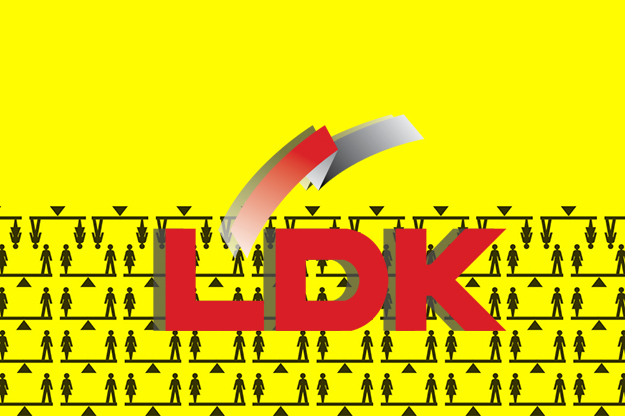
Democratic League of Kosovo (LDK)
In their 2012 program, “For a European Kosovo,” LDK outline family, young people and “female” equality as part of their vision for Kosovo’s future, insisting that more effective equality between “males and females” would make Kosovo “a more just country.”
In regards to concrete steps on how to achieve this, the program offers a strong belief in “affirmative action, which ensures effective equality between males and females, so as to provide access to education, jobs and senior positions and responsibilities for women in public life and the private sector.”
To discover more on the “affirmative actions” an LDK government would take to advance gender equality in the country, K2.0 contacted two representatives from LDK: Sokol Havolli, a senior adviser to departing prime minister Isa Mustafa, and Arban Abrashi, the Minister for Labour and Social Welfare in the last parliamentary term. We received no reply.
However, LDK minister of finance in the last government and current candidate for prime minister, Avdullah Hoti, has recently commented on equality issues on his official Instagram profile. On May 28, Hoti posted that LDK would guarantee 12 months of paid maternity leave for women in employment, adding that the party would also offer 12 months of payments to unemployed women, at a rate of 50 percent of minimum wage.
Hoti also made reference to victims of domestic violence in his post, to whom he promised care through local government and civil society organizations, adding that the party has spent the last two and a half years stabilizing the country’s finances in order to implement this.
In regard to representation of women in their party and in decision-making positions, 10 of LDK’s 33 deputies in the last parliamentary term were women. LDK led nine ministries as part of the coalition government, though just one of these was led by a woman, Hykmete Bajrami, who was the Minister for Trade and Industry. Out of 17 deputy ministerial positions, two were filled by women, one in Hoti’s Ministry of Finance and the other in Abrashi’s Ministry of Labour and Social Welfare. In LDK Prime Minister Isa Mustafa’s team of advisers, four positions were given to women, two in assistant roles.
K2.0 contacted LDK regarding how the party would help ensure the inclusion of women in future governmental positions but received no response.
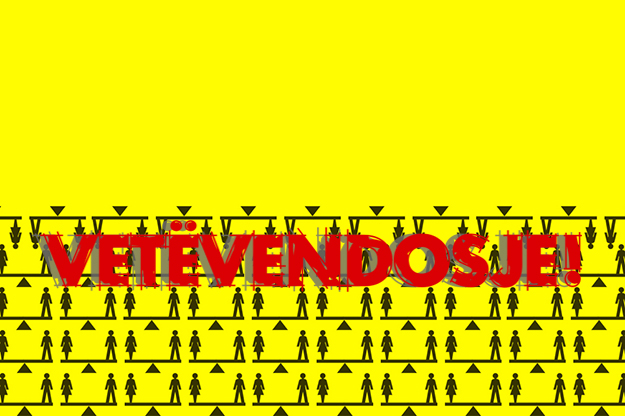
Vetevendosje
In Vetevendosje’s 2013 program, Governing Alternative, the party state that they aim to create a society with equality for women. To understand how Vetevendosje would seek to achieve this, K2.0 contacted Nazlie Bala, the head of the party’s women’s activism department, who focus on both internal and external policies on gender equality.
Bala pointed to a policy of assisting young mothers, whom she believes need support from the state with childcare. A Vetevendosje government would offer this support by providing a network of day care centers across Kosovo, which the party believe will also decrease barriers to women’s participation in the labor market. This policy has also been highlighted by Vetevendosje candidate for prime minister, Albin Kurti, who revealed 40 priorities under his government on May 25, which included establishing 160 new daycare centers in cooperation with Kosovo’s municipalities. Assistance from the party would extend especially to single mothers, who, according to Bala, would be provided with “shelter and support.”
Bala also spoke of the need to properly implement the right to paid maternity leave. She said that a Vetevendosje government would subsidize half of maternity leave paid by small and medium sized businesses. The party’s ‘Governing Alternative’ program from 2013 states that 12-month parental leave can be taken by both parents, in order to decrease discrimination towards women in the workplace caused by current legislation, which provides only two days of paid paternity leave.
“Seeing this difficulty in the law, Vetevendosje will make maternity leave 6 + 6,” Bala told K2.0. “Any parent will have the right to parental leave. With this proposal we will create a protective mechanism, and allow a return to the workplace for either the mother or for the father.”
Speaking further on the issue of discrimination against women in the workplace, Bala stressed the need to establish the Court of Labor, triple the number of work inspectors, push equality in salaries, and provide protection at work.
As well as employment, Bala highlighted education, integration and economic development as areas that Vetevendosje “would revive in order to create a developed society with gender equality.” In regard to integration, Bala believed that it was the state’s neglect towards minority communities that contributes to school dropouts caused by young marriages.
K2.0 enquired as to the mechanisms Vetevendosje would create in order to protect women in a vulnerable position. Bala listed a number, including direct work with the family of domestic violence victims by specialized professionals, prioritized handling of domestic violence cases by the Kosovo Police and Prosecution service, increasing the capacities of social services and improving efficiency in the issuing and implementing of protection orders.
In terms of representation, five of Vetevendosje’s 16 deputies at the start of the last parliamentary term were women, with Donika Kadaj-Bujupi also joining the party in March 2016 after leaving AAK. Of the 110 candidates for the the assembly Vetevendosje have listed for the upcoming election, only 33 are women, a similar figure to the other major parties. The municipality of Prishtina, which is governed by Vetevendosje has faced criticism regarding women’s representation in decision-making positions, with only two women currently heading the municipality’s 11 departments.
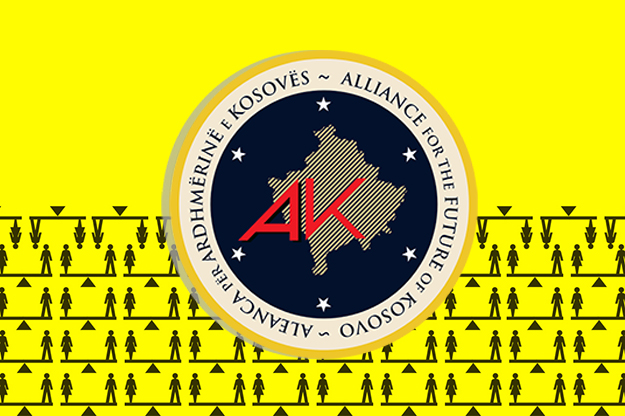
Alliance for the Future of Kosovo (AAK)
According to their 2014 program, the Alliance for the Future of Kosovo (AAK) see women as ‘the foundation of a strong society,’ and state that advancing the position of women in society is a priority. In the program, AAK pledged to implement “important laws” in the field of gender equality, and to create legal mechanisms in accordance with European Resolutions. However, they did not say how they would create these mechanisms, or how they would function.
Another aspect tackled by AAK’s political program is economic support for women. According to AAK, economic support must be offered to businesswomen, especially those that lead small and medium sized businesses. In general terms, AAK’s program states the need for “stimulative projects for women in villages” and “unique development funds;” however, it does not explain the concrete steps for creating or functionalizing them.
AAK believes that the following will positively affect the creation of better economic conditions for women: funding through grants for agricultural production, developing production and agribusinesses, increasing funding for artisan products, creating loan opportunities with no interest for women-led businesses, and creating market opportunities for agricultural and artisanal products in regional markets. However, they do not mention how funding would be secured for these projects. One area which AAK’s program neglects to tackle is regarding maternity leave, on which it is silent.
AAK also has a women’s forum called ‘The Alliance of Women,’ which is led by Magbule Shkodra, who declared through AAK’s official website that her party will manage to make 40 percent of women active participants in political parties within 10 years. She also said that 40 percent of women will be part of public institutions such as the Kosovo Assembly, the Municipal Assemblies, the Government, and other institutions.
In the most recent legislature in the Assembly, AAK held 9 seats, but in March 2016, Donika Kadaj Bujupi left the party to join Vetëvendosje. With 8 deputies left, AAK had only two women in the Assembly, Time Kadriaj and Teuta Haxhiu. In AAK’s deputy list for this year’s elections, from 40 candidates, only 12 are women, all of whom are placed at the bottom of AAK’ list; whereas men are listed from 1 to 28, women are listed 29 to 40. In the Obiliq municipality governed by AAK, of 11 municipal departments, only two are led by women: the Department for Economy and Finances, and the Department for Culture, Youth and Sport.
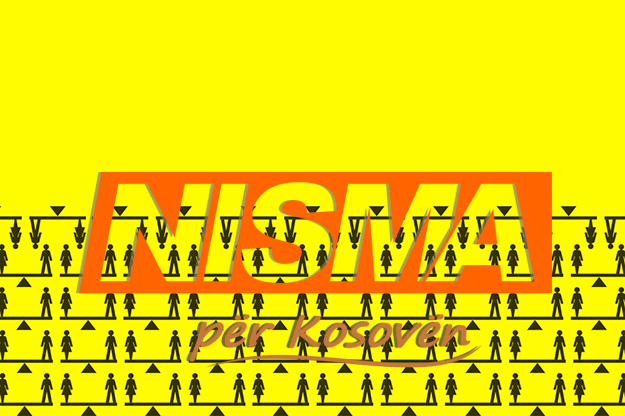
Initiative for Kosovo (Nisma)
Nisma’s first step towards gender equality comes through a call for, as they put it, “all women and girls” to join Nisma, so as to achieve a change of position in society. They say that women will not regret joining Nisma. However, the political program they launched in mid-2016 does not offer any concrete projects and mechanisms for achieving equal representation or participation for women in society.
In their program they include a section titled “For Gender Equality with no Prejudice,” in which they highlight that they “will be the subject that promotes gender equality in the region” and that that there is a ‘mountain’ of prejudice, exclusion and rejection towards the desire of women to be included in the workplace and in politics, outside of the walls of their houses.
Nisma claim to wage war on this patriarchal mentality, saying that they ‘have the willingness and knowledge’ to fight this mentality. However, it is still unclear how, as it is not elaborated further. Nisma have also declared that state mechanisms must be improved to fight violence against women in the country. K2.0 contacted the party to ask for more details but received no response.
Nisma has six deputies in the Kosovo Assembly, two of whom are women, including Valdete Bajrami, the head of their parliamentary group. Nisma also govern in the Malisheva municipality, where Ragip Begaj is the head. Among the municipality’s 11 departments, only one is led by a woman: the Department for Culture, Youth and Sports.K
Photos: Majlinda Hoxha / K2.0.
For more on where Kosovo’s political parties stand, watch K2.0’s video on ideology, and read previous articles on election issues, including employment, education, and the army.

